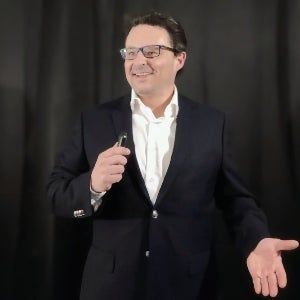Futurist Ray Kurzweil Has an Amazing Track Record For Accurate Predictions. By 2030, He Believes Humans Will Eradicate Disease and Achieve Immortality. His bold prediction and the reasoning behind it resurfaced in a YouTube video that has gone viral.
By Entrepreneur en Español Edited by Eduardo Scheffler Zawadzki

This article was manually translated from Entrepreneur en Espanol.
In 2015, futurist Ray Kurzweil made an attention-grabbing prediction: by the year 2030, humans will be able to achieve immortality.
Before you write him off as a crackpot, it's important to know that Kurzweil is a globally-renowned scientist whose work has been recognized and awarded by many prominent organizations. In 1999, he received the prestigious National Medal of Technology, and in 2002, he was inducted into the National Inventors Hall of Fame. He created the first machine capable of transforming printed text into speech (to help the blind) and developed a synthesizer capable of perfectly emulating the sound of a grand piano and other orchestral instruments.
Related: Want to See the Future? Six Founders Share Their Secrets for Making Savvy Business Predictions
Kurzweil won a Grammy Award for his contributions to music technology, and he also wrote two bestsellers: How to Create a Mind and The Singularity Is Near, in which he makes predictions about the union of humans and machines.
A month ago, the YouTuber ADAGIO uploaded a video in which he recaps Ray Kurzweil's main ideas and boldest predictions. Among them was an idea he outlined in 2005: by the year 2030, nanotechnology will allow humans to cure diseases through tiny robots capable of repairing our bodies at the cellular level, ultimately enabling us to achieve immortality. In addition to curing disease and preventing aging, technology will allow us to eat whatever we want without worrying about gaining weight or harming our bodies.
In a 2009 Reuters profile, the news agency references an interview with ComputerWorld during which the scientist explained: "The full realization of nanobots will basically eliminate biological diseases and aging. I believe we'll see widespread use in 20 years of [nanotech] devices that perform certain functions for us. In 30 or 40 years, we'll overcome disease and aging. Nanobots will explore organs and cells that need repairs and simply fix them. It will lead to deep extensions of our health and longevity."
Related: Futurist Talks to a Baby About the Meaning of Life and the Video Goes Crazy Viral
Although the prediction may seem like it's from a science fiction movie, many of Kurzweil's forecasts have come true. Among them is the idea that a computer would defeat the world chess champion before the year 2000; that by 2009, people would primarily use portable computers of various sizes and shapes, and that by 2010, most of the population would be wirelessly connected to an information network.
Considering the advances made in the field of artificial intelligence and the development of companies like Elon Musk's Neuralink, BrainCO, or MindMaze, Kurzweil's predictions don't seem so far-fetched. But will we become immortal? Only time will tell.











